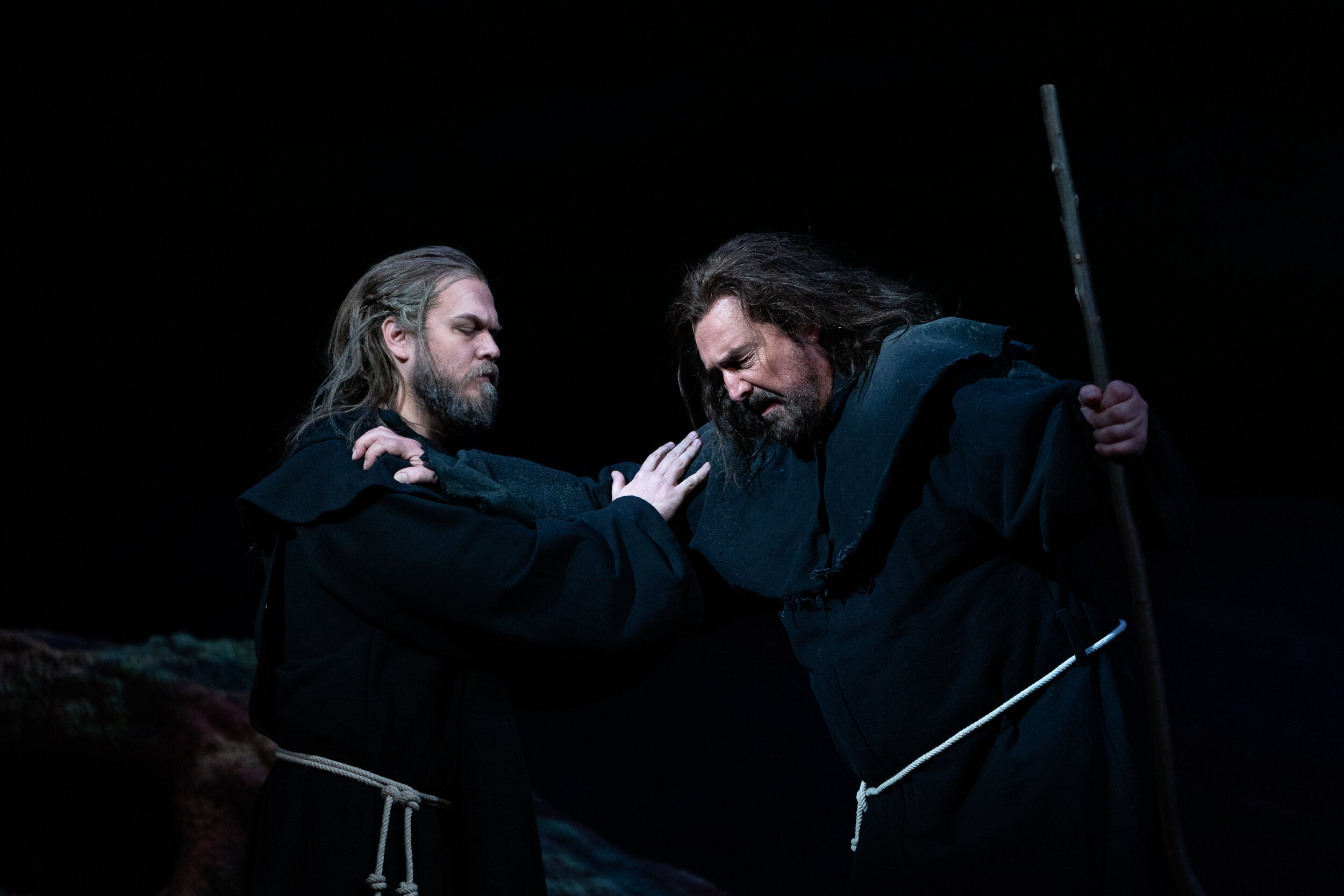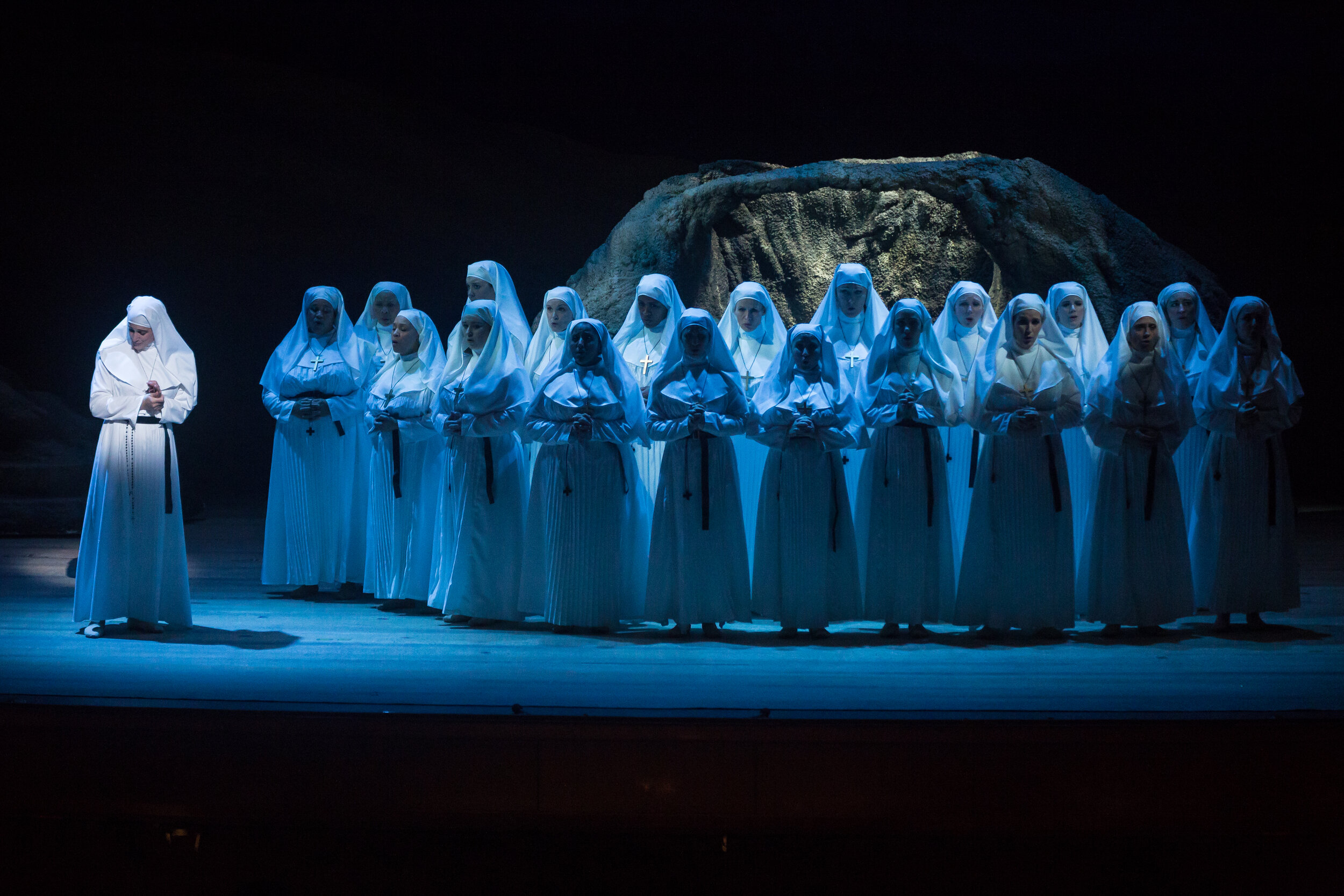Maryland Lyric Opera’s Thaïs was fun, a visual and musical delight that also tells an engaging story that confronts its audience head on with serious moral and spiritual issues centering on how to live a life. We in the audience, like the characters in the opera, have to make choices and face challenges about what we believe and how we live our own lives. We must also confront the ambiguity in the word “love”. Are we living our lives like Thaïs? Or Athanaël? Or Nicias? What love do we want?
Let’s meet those characters. Thaïs is an alluring courtesan in Alexandria, Egypt during the time of Roman occupation. She wields much power over the city’s pleasure seekers as the chief priestess of Venus, the god of love. Athanaël is a Christian monk who has given up worldly pleasures to live with other monks in the simplicity and purity of desert life. He knew Thaïs once in an earlier time but has come to blame her for the city’s moral degradation. A dream convinces him that God has given him a mission to convert Thaïs to Christianity and convince her to live out her life in a monastery. Nicias, who believes life is all there is and intends to enjoy the here and now as much as possible, is both a recent client of Thaïs and a long-time friend of Athanaël. He brings the two together. Thaïs has secretly been worrying about losing her beauty and confronting the emptiness of her love life and is convinced by Athanaël to turn from her sinful ways. Her penance exhausts her body, and she dies believing she is entering the kingdom of Heaven. In her final moments, Athanaël confesses he lied to her, that he desires her, and that he wants her to remain on earth.
Athanaël (Louis Otey) and Thaïs (Sarah Joy Miller) meet. Photo by Julian Thomas; courtesy of Maryland Lyric Opera.
Jules Massenet, the composer of Thaïs (1894), is better known for his two popular opera’s, Manon (1885) and Werther (1892). He was the most popular French composer of his day; Thaïs and many other of his operas were hits with audiences of the time but are now rarely performed. I will explore reasons for Thaïs’ lack of popularity later on. The French libretto is by Louis Gallet, based on the eponymous novel by Anatole France, which was itself based on the life of Saint Thaïs of Egypt, a legendary convert to Christianity in the 4th century. The opera, though controversial, was tolerated, but the Catholic Church put France’s work on the Forbidden List. In a break with tradition, the lyrics are in prose, not poetry – no rhyming, perhaps adding an element of starkness to the drama and making more demands on the singers and orchestra.
As I think back on the performance, I wonder how I could have considered such a drama “fun”. It is best explained by commenting on the many highlights this production offered:
The set and staging: This was a new production: the set, the lighting, the costumes, and staging were all constructed afresh for MDLO’s production. Well done, MDLO staff. The set and the lighting were marvelous in supporting the time period and the mood of different settings of the story; kudos to Harry Feiner, Stage Set and Lighting Designer, and to MDLO staff and the carpenters/artists involved. It all worked beautifully as did the new costumes designed by Sam Fleming, wigs by Anne Nesmith, and implemented by Costume Manager Dorothy Diggers. The overall result was a highly artistic presentation, colorful, with tremendous eye appeal, a worldly pleasure.
The staging engineered by Director Claudia Zahn presented the story in a believable and compelling fashion. The placement of principal players and chorus and dancers worked beautifully to carry the story forward smoothly. Telling a story with spiritual themes can easily misstep and lead to titters of laughter. This staging of Thaïs was convincing from beginning to end. As my son and I walked out, we overheard several college-age young women saying they didn’t expect to have tears in their eyes; that is a sincere compliment to the staging. I personally was rather impressed with how touching the scene was where Athanaël leads Thaïs through the desert in a hard act of penance and then shows compassion for her; I had not felt that way in the Met Opera 2008 version. Ms. Zahn got this Thais right.
The singers: Thaïs was a team effort and this team had quality players at every position. Soprano Sarah Joy Miller was excellent in the role of Thaïs. She has the voice and looks to carry this demanding role. I thought she seemed to be pushing to get out some of the early beautiful high notes, but she settled into the flow and the beauty of her singing became rapturous. She also gave a fine acting performance, first as the alluring, haughty courtesan and then as the reformed supplicant. Baritone Louis Otey also has the voice and the looks to carry his role, that of Athanaël, also a demanding role. He has a strong stage presence and is a fine actor; he even managed to elicit some sympathy from me for Athanaël at the end. He impressed with his strong baritone in his more demanding arias, though I did feel some of the more extended recitatives seemed more challenging for him. Tenor Joseph Michael Brent was very convincing as the epicurean Nicias. Mr. Brent sang impressively in his role and seemed very natural on stage. In smaller roles, also excellent were bass-baritone Hunter Enoch as Palémon, leader of the monks; mezzo-soprano Allegra De Vita as abbess Albine; soprano Sarah Joyce Cooper who sang with the dancers, including while being hoisted way up in the air; and soprano Hayan Kim as Crobyte and mezzo-soprano Caroline Hewitt as Myrtale portraying servants of Nicias. The chorus was very strong under the direction of Steven Gathman.
Nicias (Joseph Michael Brent), center) parties during the ballet scene. Photo by Julian Thomas; courtesy of Maryland Lyric Opera.
The dancers: MDLO presented the oft-omitted ballet scene, one of the production’s most delightful worldly pleasures. Sarah J. Ewing and her team of eight attractive dancers provided a thrilling interlude of joyous motion, color, and beauty backed by sumptuous music. Ah heck, they were so good and provided so much pleasure, I will name them: Diana Amalfitano, Ryan Carlough, Grace Cho, Davione Gordon, Abby Leithart, Shanice Mason, Tariq Darrell O’Meally, and Robert Woofter. As mentioned above, they worked Ms. Cooper into their routine beautifully (and safely).
The Music: Massenet’s music is melodious and beautiful throughout. The famous Méditation violin solo at the end of Scene 1 in Act II is exceptionally lovely, and its theme is used again in Act 3; this piece is often played in concerts and was played beautifully by MDLO Concertmaster Jose Miquel Cueto. The music supports the mood and setting for each scene and the music for the ballet was sheer fun. Maestro Louis Salemno leading the MDLO Orchestra turned in another stellar performance. If you have not heard them play, treat yourself to some of their upcoming concert performances. This conductor and orchestra playing Massenet’s music is definitely a worldly pleasure.
I have now enjoyed seeing two productions of Thaïs; one on video and one live. I think I now understand why Thaïs is not a popular opera. The reason most often given is that Thaïs is a showpiece opera for the rare exceptional soprano who can do justice to the role. I find this unconvincing; I believe many of today’s excellent sopranos can sing this role. The view sometimes given that the music is light weight, to me, is reaching for criticism; the music is highly enjoyable and does its job of enhancing the story telling, if not of the stature of Tristan und Isolde, certainly a worthy entrant for the repertoire.
Sarah Joy Miller as Thaïs meditates on the meaning of her life. Photo by Julian Thomas; courtesy of Maryland Lyric Opera.
Operas can wax and wane in popularity depending on the zeitgeist of an epoch. Society can be fickle or may lose interest in what an opera has to say. Thaïs’s subject matter is a faceoff between the spirit and the flesh, but our leads convert each other; they switch places. Final score: Eternal Salvation 1, Worldly Pleasures 1. This battle winds up in a tie and ties please no one. Also, it’s complicated. Athanaël’s motives are not pure; he is driven by ego and pride; even in the end we cannot be sure what his real feelings for Thaïs are. Furthermore, audiences have become more secular in makeup over time, and the secular community doesn’t embrace or at least doesn’t feel comfortable with issues of salvation and eternal life. When I look back at reviews of previous productions, I note that the reviews tend to pass over the spiritual elements lightly and focus on the singers and music. Regardless, after witnessing MDLO’s production, I have trouble seeing its lack of popularity as the opera’s fault. Met Opera did it in 2017; Minnesota Opera did it in 2018, and Utah Opera is doing it later this year. Maybe we are at the beginning of a revival; maybe our time is ready to face those issues again.
left photo: Palémon (Hunter Enoch), leader of the monks, listens to Athanaél (Louis Otey) express his distress. right photo: Abbess Albine (Allegra De Vita, left) leads the nuns. Photos by Julian Thomas; courtesy of Maryland Lyric Opera.
My bottom line is that Maryland Lyric Opera’s Thaīs worked. It succeeded on two critical levels, first as entertainment, providing an immersive sensual experience, the worldly pleasures, and at the same time, it attended to our souls if you are religious or our humanity if you are secular, albeit in a disturbing way, by involving us in an artistic experience that delved deeply into who we are at our most fundamental selves and the choices that we must make about what we believe. I think MDLO made an inspired choice and gave us the Thaïs that Massenet and Gallet intended.
The Fan Experience: There were only two performances of Thaïs, one on January 30 and one on February 1. Check this link to see MDLO’s schedule of performances for the remainder of their season; a staged version of Mozart’s Marriage of Figaro will be coming up on June 10, 12, and 14, again in the Kay Theatre.
OMG! Free parking Thursday night was a bear. I know there was a basketball game scheduled to start an hour after the opera, but something else must have also been going on. I arrived over an hour before the opera and the free 1B and Z lots were saturated. Fortunately, people seemed to be getting into the stadium paid parking with little difficulty.
Refreshments are limited in the Clarice Center for the Performing Arts which houses the Kay Theatre. There is a small bar with chips, pretzels, candy, and drinks , but a ten minute campus walk away is the UMD Student Union which features an array of fast food stands.





